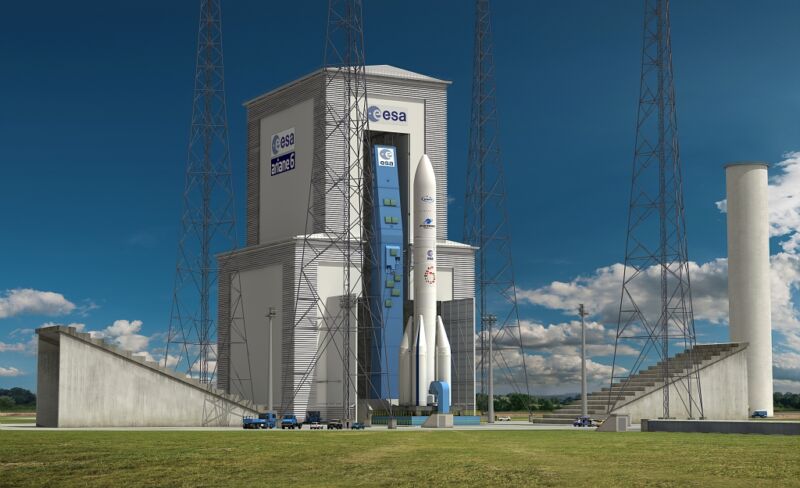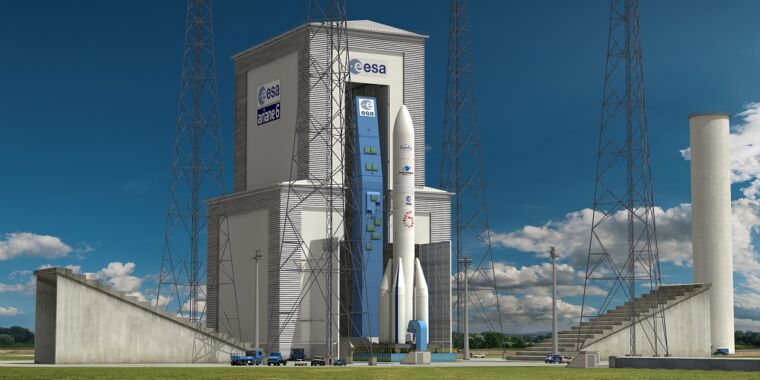
ESA-D. Ducros
Welcome to issue 5.15 of the Rocket Report! We’re back with the usual rocket news about launch delays and companies raising money on their way to orbit. Speaking of raises, is it really possible for Vector Launch to be resurrected? Read on to find out.
As always, we welcome reader submissions, and if you don’t want to miss any issue, please register using the box below (the form will not appear on AMP-compatible versions of the site). Each report includes information on small, medium and heavy rockets, as well as a quick look ahead at the next three launches on the calendar.

Terran 1 launch could slip in 2023. Relativity Space recently completed the first stage hot-fire test of the Terran 1 rocket, and engineers and technicians are now in the process of attaching the second stage to the rocket. In a few weeks, the completed vehicle will roll back to Launch Complex-16 at the Cape Canaveral Space Force Station in Florida for a static fire test and, assuming all goes well, a launch attempt, Ars reports. “We are confident in our technical readiness to launch this year, and we are still marching towards it,” said Tim Ellis, co-founder and chief executive of Relativity Space, in an interview with Ars.
There is always a but … Ellis continued, “But there are a few external factors as we approach the end of the year that could affect the timeline for us. It’s not a guarantee, but it could.” Those outside factors include other Florida spaceport users, including uncertainty surrounding NASA’s Space Launch System rocket launch in mid-November and blackout periods as part of the Army’s Holiday Airspace Release Plan. This effectively prevents launches around Thanksgiving, Christmas and New Year’s Day due to the high volume of airline flights.
Following the Canadian Rocket Race. Much has been written in this newsletter about the development of commercial launches in the United States, China, Europe and India. But what about Canada? It turns out that at least five Canadian-based companies are working to develop a native commercial launch opportunity. These companies have been summarized in a new article in SpaceQ, which is (unfortunately) behind a paywall. Most companies are working towards the goal of launching from Spaceport Nova Scotia, which is still under development.
Big ideas, small loads … The five companies are located in Calgary (AVRO Aerospace), Toronto (C6 Launch Systems, Nordspace and SpaceRyde) and Montreal (Reaction Dynamics). They’re all planning a variation of a small satellite launch vehicle, with some ideas more radical than others, for example SpaceRyde’s balloon-based launch concept. I’m not well informed enough to comment on the viability of any of these companies, but a small launch is a tough one. However, if the Canadian Space Agency started offering and awarding contracts, it would help us distinguish who is legit and who is not.
Orbex raises $45.8 million in new financing. Scotland-based Orbex announced earlier this month that it has raised £40.4 million ($45.8 million) in a Series C round led by the Scottish National Investment Bank, a new investor in the company, Space reports. news. Orbex is developing Prime, a small launch vehicle designed to put up to 180 kilograms into low Earth orbit. The vehicle, built by the company at a factory in Forres, Scotland, will initially be launched from Space Hub Sutherland, a new launch site under development in northern Scotland.
Prime time in 2023? … Orbex previously raised $24 million in December 2020 and $39 million in July 2018. The company also won 7.45 million euros from the European Space Agency in March 2021 as part of the Boost! program to support the development of new launch vehicles. The company says it is targeting the first launch of its Prime rocket next year and is working toward its “long-term goal of building a reliable, economically successful and environmentally sustainable European space launch company.” (submitted by Ken the Bin and EllPeaTea)

